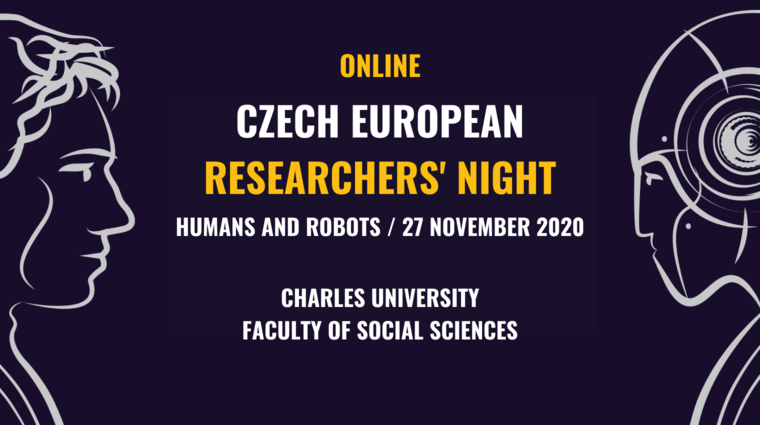Czech European Researches' Night 2020: Humans and Robots

Czech European Researches' Night 2020: Humans and Robots
Czech European Researchers’ Night, an event that, for one evening, brings life to hundreds of science buildings that no ordinary mortal can enter is held virtually this year on Friday, November 27, 2020. And our academics are part of it!
Most of the programme is in Czech, however you can find a few commented presentations, guided tours, performances, videos, interviews, lectures and experiments in English. See the full programming English. Faculty of Social Sciences is also part of this year's virtual science night with two commented presentations by PhDr. Vít Střítecký, M.Phil., Ph.D. and by PhDr. Václav Moravec, Ph.D., Ph.D. and Veronika Macková, Ph.D. Both held in Czech language.
- 9:30 pm – 10:20 pm AI AND ENVIRONMENT by PhDr. Vít Střítecký, M.Phil., Ph.D.
The commented lecture will suggest an alternative way of thinking about the relationship between machine learning (AI) and its environmental costs. With the increasing use of machine learning methods practically in all areas of human activity, the environmental burden is increasing.
The solution is not a criticism requiring regulation in the use of these technologies, but rather a change in approach to machine learning. Where the goal is not to achieve the highest possible accuracy regardless of application requirements, but accuracy that is based on an analysis of cognitive tasks in individual empirical contexts sufficient to meet them. This approach could reduce energy-intensive experiments, which yield marginal practical benefits at considerable cost.
PhDr. Vít Střítecký, M.Phil., Ph.D. is a programme coordinator of the Master in International Security Studies (MISS) and academic supervisor of the Erasmus Mundus International Master in Security, Intelligence and Strategic Studies (IMSISS).
- 5:00 pm - 6:20 pm ROBOT REPORTERS VS. PEOPLE-JOURNALISTS. INEQUAL DUEL? by PhDr. Václav Moravec, Ph.D., Ph.D. and Veronika Macková, Ph.D.
Ten years ago, automated or robotic journalism began to become part of everyday editorial practice in the United States and the United Kingdom. The beginnings of this era are connected with the creative software Quill and Wordsmith, developed by Narrative Science and Automated Insights, which in a few seconds generate sports or economic reports that are indistinguishable from human-written texts. Today, robotic reporters are part of the newsrooms of global news agencies such as Reuters and The Associated Press (AP). In the Czech Republic, the Czech Press Office (ČTK) became a pioneer of robotic journalism, which used templates to publish election results in 2018. A year later, a research team led by the Faculty of Social Sciences of Charles University provided ČTK with algorithms generating reports on business results on the Stock Exchange in Prague. The stock exchange reporter is now used daily by the economic server E15.cz and also by the printed version of the E15. Do you know the difference between a text from a journalist and a stock market robot?
PhDr. Václav Moravec, Ph.D., Ph.D is a Czech editor, moderator and university teacher of journalism at the Institute of Communication Studies and Journalism. Veronika Macková, Ph.D. is a moderator and university teacher of journalism at the Institute of Communication Studies and Journalism.





